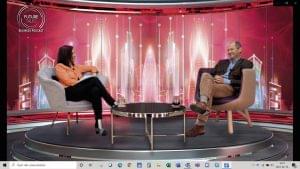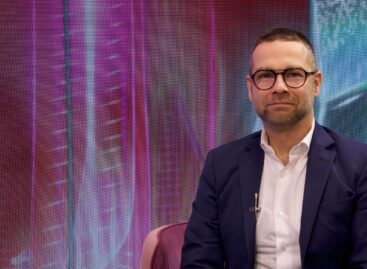Trade magazin launches Business Podcast: Future Talks with Szilvia Krizsó – ‘Those who step on the gas too hard will come out of this badly’
…said György Jaksity, chairman of the board of directors at Concorde, the first guest in Trade magazine’s new podcast series, Future Talks. In the following you can read parts of the interesting conversation with Szilvia Krizsó, but the full interview can be found at the futuretalks.hu website.
Szilvia Krizsó: – You took a step back from operative management a decade ago. How much did this add to the company’s business value?
György Jaksity:– It was a conscious decision: 12 years ago we decided to slow the company down a bit, mentally we were unable to keep track of what was happening after 16 years of doing that night and day. Concorde and its affiliates employ 200 people, we are a relatively small company on the world stage. There is no rigid hierarchy at us, so some of us had to step off the scene if we wanted young talents to fill higher positions.

Future Talks with Szilvia Krizsó every Monday at 5 p.m. ! Watch and listen to the podcast with György Jaksity any time
K.Sz.: – In this respect you played a pioneering role, as at the age of 42 you realised the time had come to give room to others, because it couldn’t be guaranteed that you would understand the changes that managers younger than you were likely to…
J.Gy.: – We weren’t afraid of not understanding the world around us, we simply saw that the time would come when this happens, so we decided to make the transition in cooperation with customers and colleagues.
K.Sz.: – How do you keep up with the changes taking place now?
J.Gy.: – Being a financial and capital market company, we must know everything about everything. I have always been interested in healthcare and I couldn’t list how many books I read about the health industry and health sciences in the last few years. It wasn’t common knowledge yet – although news was already reaching us from China – that there was a pandemic, when I started reading a book on virology. By February 2020 I already made a scenario for the economic troubles that were coming.
K.Sz.: – Did your scenario prove to be right?
J.Gy.: – Perfectly. My contracts for deals protecting my portfolio were completed by 19 February 2020. It cost me a couple of million forints to take these steps and I was wondering: Am I too pessimistic and will there be no trouble at all? There had been epidemics starting in China many times earlier that finally never reached us…Stock exchanges started collapsing the next day and this continued until 19 March.
K.Sz.: – What is waiting for us from an economic policy perspective 5-10 years from now?
J.Gy.: – 2021 will be about bouncing back. Due to the differences in managing the pandemic and the success rates of these differing strategies, the countries of the world will return to the level of their pre-pandemic economic performance at various times this year and the next. Everyone will reach the 2019 level in 2021 and 2022. Like every crisis does, this pandemic showed: better constructed structures can cope with bigger pressure. The big question is whether the pandemic took care of the necessary cleansing that usually recessions do.
K.Sz.: – What is the best way of making reserves? How can you prepare for this?
J.Gy.:– The golden rule is countercyclical economic policy. This means that in good years the state budget needs to reduce its impact on the economy by cutting state debt, and it mustn’t boost economic growth because the private sector will do it anyway. Monetary policy must use higher interest rates, and as the economic growth is strengthening, a stricter monetary policy is required. When the slowdown or a recession finally occurs, interest rates can be cut because they are high, monetary banks can pump money into the economy and the state budget has room to get indebted again. //
Related news
(HU) A DJ olyan, mint egy pszichológus
🎧 Hallgasd a cikket: Lejátszás Szünet Folytatás Leállítás Nyelv: Auto…
Read more >(HU) Török Dávid: Misszióm, hogy megváltoztassam az ingatlanosok imázsát
🎧 Hallgasd a cikket: Lejátszás Szünet Folytatás Leállítás Nyelv: Auto…
Read more >Related news
Festival buzz at the 60th anniversary EuroShop trade fair
🎧 Hallgasd a cikket: Lejátszás Szünet Folytatás Leállítás Nyelv: Auto…
Read more >No matter how much you save, food and gadgets always take the money
🎧 Hallgasd a cikket: Lejátszás Szünet Folytatás Leállítás Nyelv: Auto…
Read more >Historic price reduction at ALDI
🎧 Hallgasd a cikket: Lejátszás Szünet Folytatás Leállítás Nyelv: Auto…
Read more >








